Joe Biden will cut tariffs, change immigration policy and rebuild infrastructure, Moodys’ Mark Zandi predicts
Big changes are coming on the other side of Biden’s inauguration though much depends on who controls the senate.

Throughout the nation’s history, the transition from one president to the next didn’t mean much, at least when it came to the economy. Not so with the vexed handoff from President Donald Trump to President Joe Biden. Big changes are coming on the other side of Biden’s inauguration, and much for the good.
First up for Biden will be dealing with the COVID-19 pandemic. The virus is out of control and doing massive damage to the economy, as an increasing number of local officials, alarmed by their overflowing hospitals, believe that they have to reimpose restrictions on business activity. Nervous Americans are also appropriately spooked into more diligent self-quarantining. The economy is on the precipice of another recession.
Congress has finally come to terms on a $900 billion fiscal rescue package to pull the economy back from the ledge, but Trump threw chaos into the political process by demanding larger stimulus checks. Democrats love the idea, but many Republicans, whom the president presumably leads, don’t. It’s hard to imagine that lawmakers won’t find a way around the president’s last minute gambit and pass the legislation, but if they can’t, the economy will be in free-fall.
Trump never came to grips with the gravity of the pandemic, and he never provided a coherent response to the health-care crisis. He couldn’t even embrace basic recommendations from his own health officials, such as mask-wearing. Biden’s perspective and response to the crisis will be the opposite, as his administration will lead the way on more testing and tracing and a coordinated effort to distribute vaccines and increase their adoption.
To be sure, how much Biden will be able to change depends on the outcome of the two Georgia runoff Senate races in early January. If even one of the Republican candidates wins, which analysts think likely, the Senate will remain under Republican control. With the House under Democratic control, we will have a divided Congress, and big legislative changes will be tougher to come by.
However, there are reasonable odds that once the pandemic winds down, Biden will be able to get Congress to agree to a sizable infrastructure package. There is no better way to get the millions of workers who have permanently lost their jobs due to the pandemic back to work. Communities across the country are overwhelmed by the number of long-term unemployed and have a desperate need for better roads, bridges, water and sewage systems, and internet access. With interest rates at record lows and likely to remain there for a while, identifying projects that make compelling economic sense won’t be difficult.
Biden will also use executive orders—a directive by the president to do something without legislation—to make changes. Trump aggressively used executive orders to raise tariffs on many of our trading partners, to severely restrict foreign immigration, and to pull back regulations on the fossil fuel industry and efforts to address climate change. Biden will use executive orders as aggressively as Trump to unwind what Trump has done.
On trade, Biden will continue to confront the Chinese, as he is as distrustful as Trump of their economic practices, but he will quickly pull back on the higher tariffs that Trump has imposed on many of our allies. The higher tariffs have done nothing to reduce our trade deficit — Trump’s misplaced goal — but have hurt American businesses and consumers who end up paying the higher tariffs. Biden will also re-engage with multilateral international organizations, such as the World Trade Organization, the International Monetary Fund, and the World Bank, that the United States helped establish decades ago to adjudicate trade disputes and facilitate the integration of the global economy, which has been a boon to living standards.
Biden will do a quick 180 on Trump’s callous efforts to curtail immigrants from making the U.S. their home. Before Trump, about one million immigrants came here each year. This year, immigration appears to be no more than one-fourth that. There is no more effective way to increase our economy’s long-term growth than to have the world’s best and brightest come to our universities and then stay once they graduate to start companies and innovate. And given the aging of our population, we will eventually need more immigrants of all education and skill levels to power our economy.
Nothing will change more dramatically under the Biden administration than climate change policy. There has been none under Trump, as one of his first acts as president was to pull out of the Paris Climate agreement. He has also significantly pulled back regulations of the fossil fuel and utilities industries and reduced gas mileage requirements for vehicles. Biden will reverse all of this and endeavor to increase investments in green technologies, under the appropriate premise that there is no more serious threat to our economy’s long-term prospects than climate change.
The economy Trump will hand over to Biden in a few weeks is in shambles. To put it back together any time soon will require big changes in the pandemic response and to economic policy. Joe Biden is sure to do both once sworn in as the nation’s 46th president.